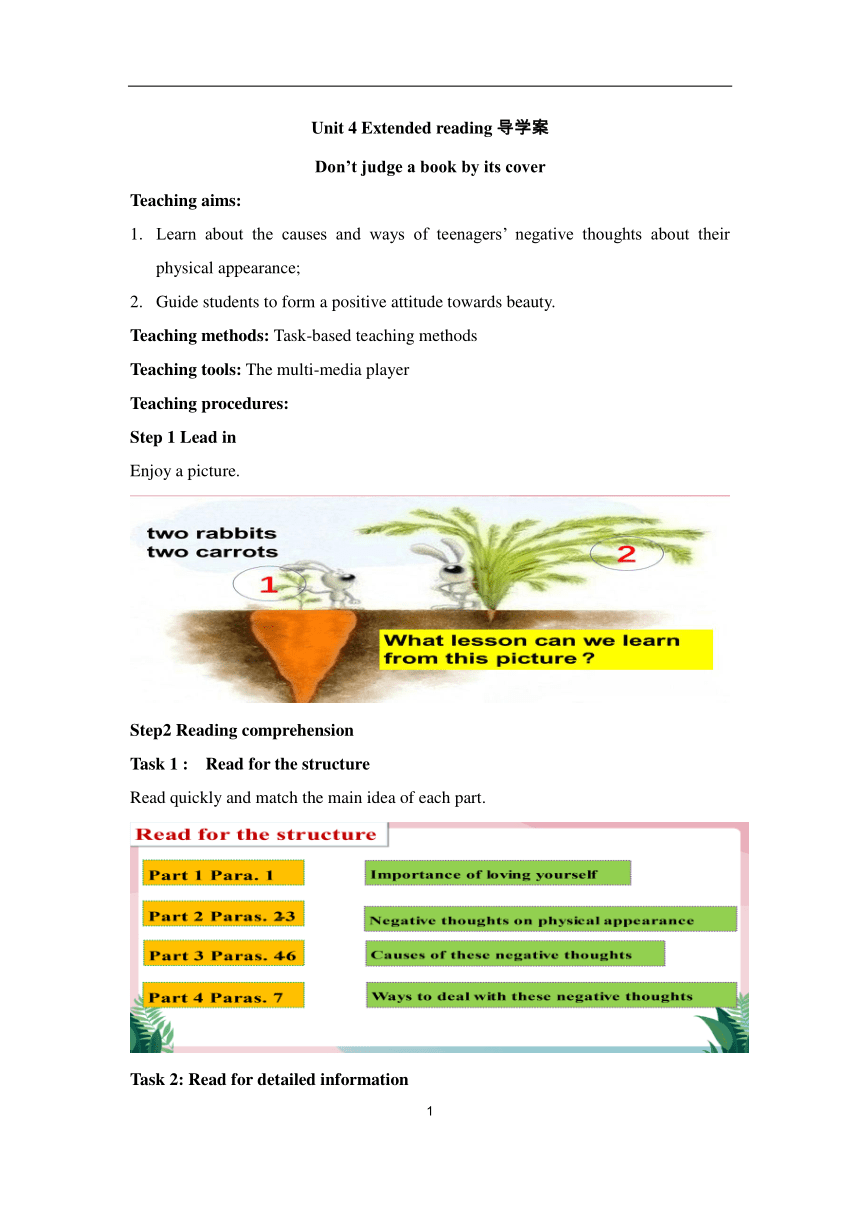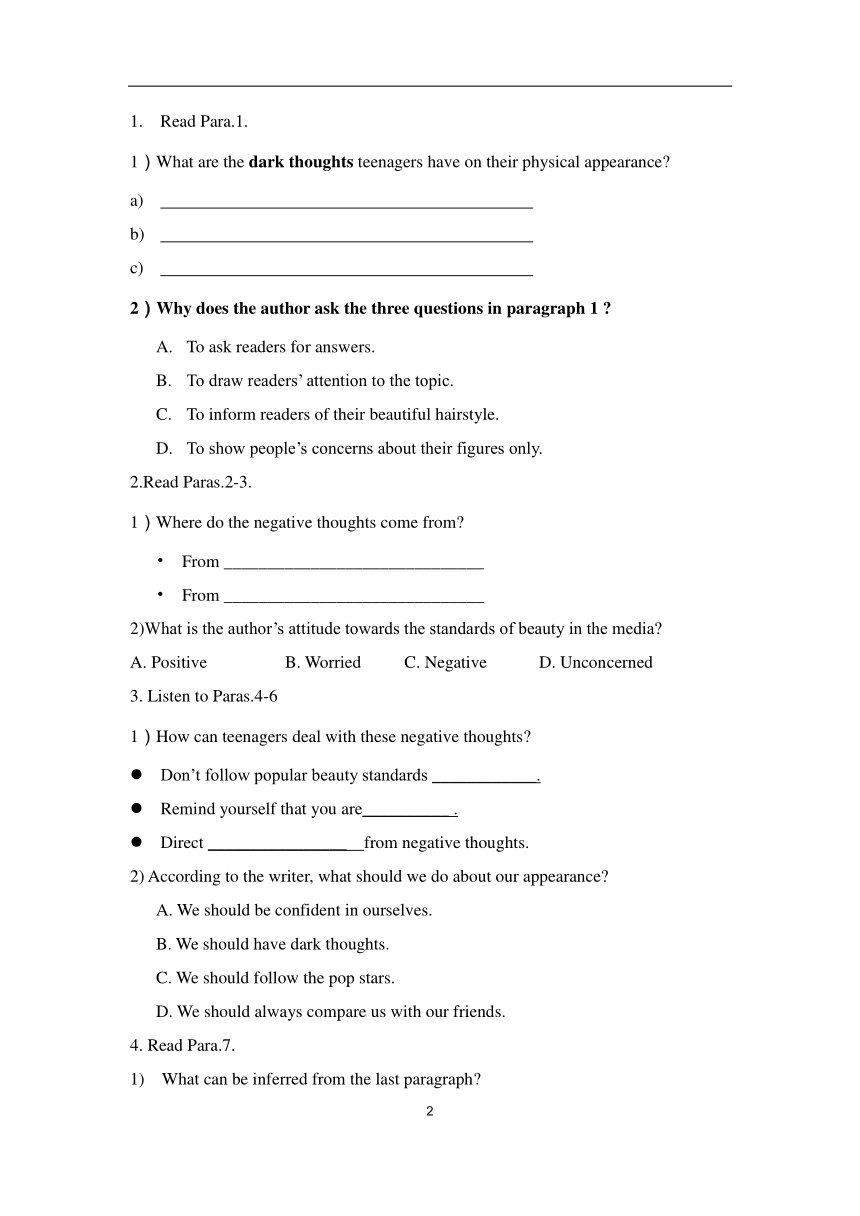牛津译林版(2019)必修第一册Unit 4 Looking Good, Feeling Good Extended reading 导学案(无答案)
文档属性
| 名称 | 牛津译林版(2019)必修第一册Unit 4 Looking Good, Feeling Good Extended reading 导学案(无答案) |  | |
| 格式 | docx | ||
| 文件大小 | 905.9KB | ||
| 资源类型 | 教案 | ||
| 版本资源 | 牛津译林版(2019) | ||
| 科目 | 英语 | ||
| 更新时间 | 2024-02-21 11:57:59 | ||
图片预览


文档简介
Unit 4 Extended reading导学案
Don’t judge a book by its cover
Teaching aims:
Learn about the causes and ways of teenagers’ negative thoughts about their physical appearance;
Guide students to form a positive attitude towards beauty.
Teaching methods: Task-based teaching methods
Teaching tools: The multi-media player
Teaching procedures:
Step 1 Lead in
Enjoy a picture.
Step2 Reading comprehension
Task 1 : Read for the structure
Read quickly and match the main idea of each part.
Task 2: Read for detailed information
1. Read Para.1.
1)What are the dark thoughts teenagers have on their physical appearance
2)Why does the author ask the three questions in paragraph 1
To ask readers for answers.
To draw readers’ attention to the topic.
To inform readers of their beautiful hairstyle.
To show people’s concerns about their figures only.
2.Read Paras.2-3.
1)Where do the negative thoughts come from
From ______________________________
From ______________________________
2)What is the author’s attitude towards the standards of beauty in the media
A. Positive B. Worried C. Negative D. Unconcerned
3. Listen to Paras.4-6
1)How can teenagers deal with these negative thoughts
Don’t follow popular beauty standards ____________.
Remind yourself that you are__________ .
Direct ________________ from negative thoughts.
2) According to the writer, what should we do about our appearance
A. We should be confident in ourselves.
B. We should have dark thoughts.
C. We should follow the pop stars.
D. We should always compare us with our friends.
4. Read Para.7.
1) What can be inferred from the last paragraph
A. We are all unique and have our own beauty.
B. We should not follow popular beauty standards blindly.
C. We should focus on our strengths to build up confidence.
D. We should judge ourselves by what is on the inside, not on the outside.
2) Conclusion: True beauty lies in our _____ (inner / outward) world.
<设计意图:通过多种形式,听读结合,从面到点弄懂文本。>
Step 3 Discussion
Enjoy an instructive video.
Let’s discuss: “What should we do to show our beauty ”
<设计意图:通过观看抗疫志愿者的视频,进一步理解美的真谛---美不能光看外表,更要看行为举止和内在品质。依托语篇学习,发散学生思维,真正实现拓展性阅读的价值。>
Step 4 Summary
Step 5 Homework
假设你是李华,你的朋友Peter因为自己体型偏胖,同学们经常嘲笑他,为此他感到非常苦恼,于是写了一封信向你咨询。请你按照以下要求给他写一封回信。
内容包括:
表示安慰;2. 给出建议。
注意:1. 词数100左右;2. 可以适当增加细节,以使行文连贯。
<设计意图:根据所学内容,引导学生灵活写作,将课内知识转化为课外能力。>
不要以貌取人(译文)
古语说得好:“不要以貌取人。”可惜的是,作为青少年,你们恰恰却经常以貌取己。关于外表的负面思绪可能会像云一样始终笼罩着你。我穿这条牛仔裤是不是显胖 别人会不会觉得我太矮 大家背地里是不是都在嘲笑我的新发型 无论男女,不管什么样的体形或身高,人们都会受到这些想法的负面影响,而防备这些思绪背后的成因就成了一件重要的事情。
媒体的审美标准会对你如何看待自己的外表产生很大影响。那些试图模仿他们最喜爱的明星形象的青少年们正在打一场无望取胜的仗----因为对于大多数人来说,这些标准都难以企及。到头来,他们只会觉得自己更糟。
朋友也会影响你对自己外表的看法。如果你有朋友长得好看,或者很有时尚品位,你会觉得自己活在他们的阴影下。对于数字时代的孩子们来说,社交媒体会让这个问题变得更加棘手。你的朋友可能会无休止地在网上发自拍,炫耀他们漂亮的衣服或强壮的体格,你也更容易陷入和他们的比较之中。事实证明,这种行为会对你如何评价自己的外表产生负面影响。
这些外部影响始终存在,不过我们当然也有办法应对它们。首先要审慎,不要盲从流行的审美标准。这些标准,我们之中99%的人都是达不到的,所以最好不要理会它们。
还有一个办法是你要提醒自己你是独一无二的。你要记住,你的家人和朋友都喜爱你本来的样子。可以和你信任的人谈谈自己的感受。听听他们有多么在乎你,将有助于你更好地接受自己的形象。专注于自己的强项也能帮你建立自信。个人都有自己的天赋一一你也许擅长画画或弹钢琴,所以要为自己擅长的事感到自豪,而不要为你无法改变的事而烦恼。
最后,尽力转移你在这些消极想法上的注意力也是一个不错的办法。为了做到这一点,你应该做一些你乐在其中的事。读一本你喜欢的书,或者参加一项社交活动,比如和朋友们一起打球。这些事能帮你暂时忘却那些让你烦心的事,让你对自己的感觉好一些。
自我评价时,你可能常常注重外在,而不是内在。然而就像一本书,内容要远比封面重要。如果你能学会看到自己的优点一一你的个性、你对他人的价值你的成就你很快就会爱上自己本来的样子。
2
Don’t judge a book by its cover
Teaching aims:
Learn about the causes and ways of teenagers’ negative thoughts about their physical appearance;
Guide students to form a positive attitude towards beauty.
Teaching methods: Task-based teaching methods
Teaching tools: The multi-media player
Teaching procedures:
Step 1 Lead in
Enjoy a picture.
Step2 Reading comprehension
Task 1 : Read for the structure
Read quickly and match the main idea of each part.
Task 2: Read for detailed information
1. Read Para.1.
1)What are the dark thoughts teenagers have on their physical appearance
2)Why does the author ask the three questions in paragraph 1
To ask readers for answers.
To draw readers’ attention to the topic.
To inform readers of their beautiful hairstyle.
To show people’s concerns about their figures only.
2.Read Paras.2-3.
1)Where do the negative thoughts come from
From ______________________________
From ______________________________
2)What is the author’s attitude towards the standards of beauty in the media
A. Positive B. Worried C. Negative D. Unconcerned
3. Listen to Paras.4-6
1)How can teenagers deal with these negative thoughts
Don’t follow popular beauty standards ____________.
Remind yourself that you are__________ .
Direct ________________ from negative thoughts.
2) According to the writer, what should we do about our appearance
A. We should be confident in ourselves.
B. We should have dark thoughts.
C. We should follow the pop stars.
D. We should always compare us with our friends.
4. Read Para.7.
1) What can be inferred from the last paragraph
A. We are all unique and have our own beauty.
B. We should not follow popular beauty standards blindly.
C. We should focus on our strengths to build up confidence.
D. We should judge ourselves by what is on the inside, not on the outside.
2) Conclusion: True beauty lies in our _____ (inner / outward) world.
<设计意图:通过多种形式,听读结合,从面到点弄懂文本。>
Step 3 Discussion
Enjoy an instructive video.
Let’s discuss: “What should we do to show our beauty ”
<设计意图:通过观看抗疫志愿者的视频,进一步理解美的真谛---美不能光看外表,更要看行为举止和内在品质。依托语篇学习,发散学生思维,真正实现拓展性阅读的价值。>
Step 4 Summary
Step 5 Homework
假设你是李华,你的朋友Peter因为自己体型偏胖,同学们经常嘲笑他,为此他感到非常苦恼,于是写了一封信向你咨询。请你按照以下要求给他写一封回信。
内容包括:
表示安慰;2. 给出建议。
注意:1. 词数100左右;2. 可以适当增加细节,以使行文连贯。
<设计意图:根据所学内容,引导学生灵活写作,将课内知识转化为课外能力。>
不要以貌取人(译文)
古语说得好:“不要以貌取人。”可惜的是,作为青少年,你们恰恰却经常以貌取己。关于外表的负面思绪可能会像云一样始终笼罩着你。我穿这条牛仔裤是不是显胖 别人会不会觉得我太矮 大家背地里是不是都在嘲笑我的新发型 无论男女,不管什么样的体形或身高,人们都会受到这些想法的负面影响,而防备这些思绪背后的成因就成了一件重要的事情。
媒体的审美标准会对你如何看待自己的外表产生很大影响。那些试图模仿他们最喜爱的明星形象的青少年们正在打一场无望取胜的仗----因为对于大多数人来说,这些标准都难以企及。到头来,他们只会觉得自己更糟。
朋友也会影响你对自己外表的看法。如果你有朋友长得好看,或者很有时尚品位,你会觉得自己活在他们的阴影下。对于数字时代的孩子们来说,社交媒体会让这个问题变得更加棘手。你的朋友可能会无休止地在网上发自拍,炫耀他们漂亮的衣服或强壮的体格,你也更容易陷入和他们的比较之中。事实证明,这种行为会对你如何评价自己的外表产生负面影响。
这些外部影响始终存在,不过我们当然也有办法应对它们。首先要审慎,不要盲从流行的审美标准。这些标准,我们之中99%的人都是达不到的,所以最好不要理会它们。
还有一个办法是你要提醒自己你是独一无二的。你要记住,你的家人和朋友都喜爱你本来的样子。可以和你信任的人谈谈自己的感受。听听他们有多么在乎你,将有助于你更好地接受自己的形象。专注于自己的强项也能帮你建立自信。个人都有自己的天赋一一你也许擅长画画或弹钢琴,所以要为自己擅长的事感到自豪,而不要为你无法改变的事而烦恼。
最后,尽力转移你在这些消极想法上的注意力也是一个不错的办法。为了做到这一点,你应该做一些你乐在其中的事。读一本你喜欢的书,或者参加一项社交活动,比如和朋友们一起打球。这些事能帮你暂时忘却那些让你烦心的事,让你对自己的感觉好一些。
自我评价时,你可能常常注重外在,而不是内在。然而就像一本书,内容要远比封面重要。如果你能学会看到自己的优点一一你的个性、你对他人的价值你的成就你很快就会爱上自己本来的样子。
2
